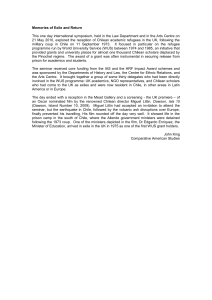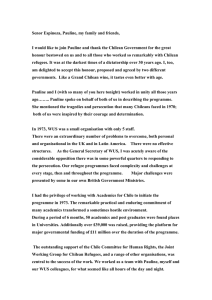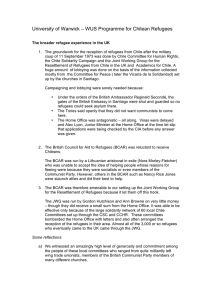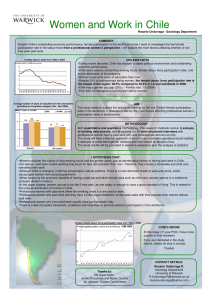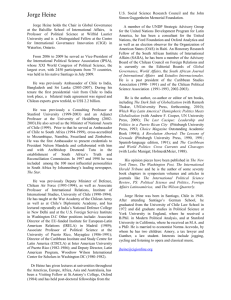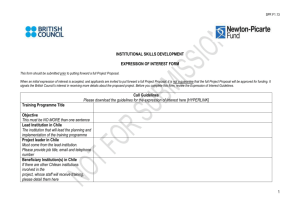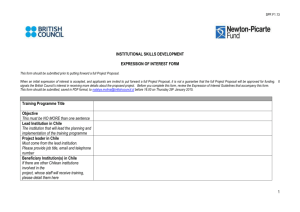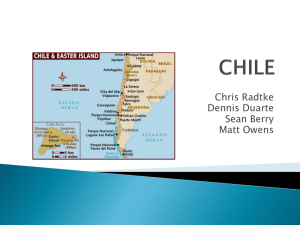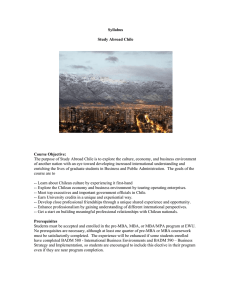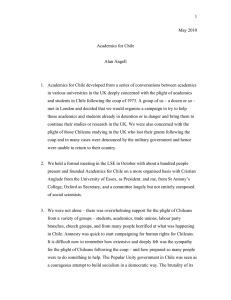Document 13072694
advertisement
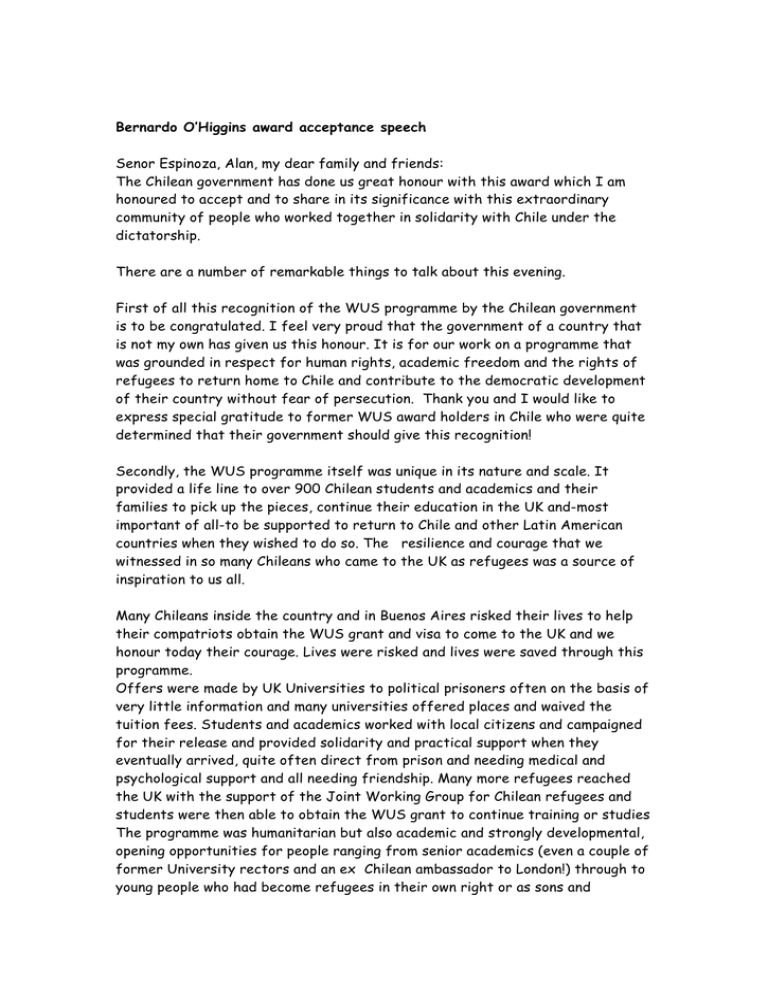
Bernardo O’Higgins award acceptance speech Senor Espinoza, Alan, my dear family and friends: The Chilean government has done us great honour with this award which I am honoured to accept and to share in its significance with this extraordinary community of people who worked together in solidarity with Chile under the dictatorship. There are a number of remarkable things to talk about this evening. First of all this recognition of the WUS programme by the Chilean government is to be congratulated. I feel very proud that the government of a country that is not my own has given us this honour. It is for our work on a programme that was grounded in respect for human rights, academic freedom and the rights of refugees to return home to Chile and contribute to the democratic development of their country without fear of persecution. Thank you and I would like to express special gratitude to former WUS award holders in Chile who were quite determined that their government should give this recognition! Secondly, the WUS programme itself was unique in its nature and scale. It provided a life line to over 900 Chilean students and academics and their families to pick up the pieces, continue their education in the UK and-most important of all-to be supported to return to Chile and other Latin American countries when they wished to do so. The resilience and courage that we witnessed in so many Chileans who came to the UK as refugees was a source of inspiration to us all. Many Chileans inside the country and in Buenos Aires risked their lives to help their compatriots obtain the WUS grant and visa to come to the UK and we honour today their courage. Lives were risked and lives were saved through this programme. Offers were made by UK Universities to political prisoners often on the basis of very little information and many universities offered places and waived the tuition fees. Students and academics worked with local citizens and campaigned for their release and provided solidarity and practical support when they eventually arrived, quite often direct from prison and needing medical and psychological support and all needing friendship. Many more refugees reached the UK with the support of the Joint Working Group for Chilean refugees and students were then able to obtain the WUS grant to continue training or studies The programme was humanitarian but also academic and strongly developmental, opening opportunities for people ranging from senior academics (even a couple of former University rectors and an ex Chilean ambassador to London!) through to young people who had become refugees in their own right or as sons and daughters of people forced to flee their country and who had barely started their higher education. I had the huge privilege of working at both ends of the programme here in the UK and then in Santiago where WUS organised a programme of support to those wishing to return. I witnessed first hand the successes of this programme, the courage of those who returned in the first years of the retornados programme under the same regime that had sent them into exile in the first place and the contribution to democratic development they made. We have much still to learn from the experience of this unique programme even now. In fact the last time I was in Chile was in 1987 with Pinochet still in power and I led a research project into the economic integration of those returning -studies such as this one and others are around somewhere and we should find them! The third remarkable thing is this extraordinary group of people in the UK who came together in common cause around Chile and a huge number of people around the country who mobilised around human rights as well as in providing practical support and friendship to the nearly 10,000 refugees who arrived in the UK. The experience was life changing for many of us. It was also the basis for later expanding our awareness of the political situation in Uruguay, Argentina, Paraguay, Bolivia, Colombia –people in the Cono Sur countries in the 1970s were suffering considerably and struggling for an end to the violence and repression of military dictatorships with many forced into exile. Interest and awareness of Latin American issues grew in the UK over this period in Universities, Churches, trade unions and in wider society and this continues through to today. For many of us, we took the lessons and experiences of our work on Chile northwards to Central America to work with refugees, displaced people and victims of human rights violations during the wars and conflicts of that region in the 1980’s. In the UK, human rights and solidarity groups focusing on Central America were able to build upon the organisation and awareness that started with Chile. My own path eventually led me to El Salvador in the midst of a brutal civil war and to the final remarkable thing I want to talk about because Chile set me on a path to Mexico and Central America and to my family In El Salvador I met my husband and life companion Francisco (Paco) . Two of our children Gaby and Pablo are here this evening. Sadly, Maite is in Haiti and Javier in Tenerife so cannot be with us –but this tells you a bit about our family DNA and travel! I cannot thank them enough for the wonderful and amazing people they all are and for their love. I have to end by saying that I am Belfast born and my mother who cannot be here this evening is just delighted that our honour bears the name of an Irishman and a rebel! Sincere thanks to you Senor Espinoza and to the Embassy staff, for your hard work in making this evening possible and to all of you for being here. Pauline Martin London 9th September 2010
